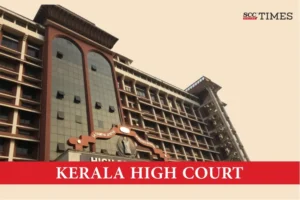Kerala High Court: In a petition filed under Section 482 of the Code of Criminal Procedure, 1973 (‘CrPC’) seeking quashing of a complaint filed under Section 12 of the Protection of Women from Domestic Violence Act, 2005 (‘DV Act’), the Single Judge Bench of A. Badharudeen, J., while partly allowing the petition held that since the parents of the daughter-in-law are not in a domestic relationship with the mother-in-law, they cannot be proceeded against under Section 12 of the DV Act., however, the proceedings can continue against the daughter-in-law.
Background
After the marriage due to domestic violence, the daughter-in-law filed a complaint before the Police and then another before the Judicial First-Class Magistrate-I (‘Magistrate’).
The daughter-in-law also filed an application before the Family Court seeking the return of money and mandatory injunction. In this application, the Family Court passed an order restraining mother-in-law and her children from alienating and encumbering the property wherein the shared household is situated, until further orders.
Thereafter, mother-in-law filed a complaint under Section 12 of the DV Act against her daughter-in-law and her parents.
Issues and Analysis
1. Whether mother-in-law had any domestic relationship, as defined under Section 2(f) of the DV Act, with the daughter-in-law and her parents?
The Court perused the definition of ‘aggrieved person’ under Section 2(a) and of ‘domestic relationship’ under Section 2(f) of the DV Act. After such perusal, the Court stated that the vital ingredient to find a ‘domestic relationship’ is to see whether there is a relationship between two persons, who live or lived together in a shared household.
The Court noted that the complaint does not suggest that the parents of the daughter-in-law and mother-in-law are in a domestic relationship i.e., they live or have ever lived together in a shared household. Noting this, the Court agreed with the contention that mother-in-law’s complaint would not be maintainable as against the parents of the daugher-in-law.
2. Whether the High Court, by invoking its inherent power under Section 482 of CrPC, quash proceedings under the DV Act?
The Court stated that the power under Section 482 of CrPC and Section 528 of Bharatiya Nagarik Suraksha Sanhita, 2023 (‘BNSS’) is an inherent, innate, and intrinsic one, as it permits the High Court to make such order as may be necessary to give effect to any order under the CrPC or BNSS or to prevent abuse of process of court or otherwise to secure the ends of justice. Therefore, it cannot be held that these sections cannot be invoked in DV act proceedings and there is a bar to exercise the said power.
At the same time, the Court stated that since DV Act proceedings are civil, the petitioners could choose to just not press, settle, or withdraw the proceedings to end them, for which, power under Section 482 of CrPC or Section 528 of BNSS need not be invoked. But, when the proceedings under the DV Act are found to be an abuse of the process of the Court, to secure the ends of justice and to save the parties from being involved in frivolous litigation, the High Court must exercise its inherent power otherwise, abuse of process of Court would not be addressed or prevented.
Noting the aforesaid, the Court held that the proceedings initiated under Section 12 of the DV Act against parents of daughter-in-law are not maintainable and the same are liable to be quashed. Accordingly, the Court partly allowed the petition and quashed the proceedings against the parents while allowing them to continue against the daughter in law, as per law.
[Sunny Mathew v. State of Kerala, 2024 SCC OnLine Ker 7182, decided on 10-12-2024]
Advocates who appeared in this case :
For the petitioner: Advocate Rinny Stephen Chamaparampil and Advocate Asha Elizabeth Mathew
For the respondent: Advocate K.V. Anil Kumar, Advocate Swapna Vijayan, Advocate Radhika S. Anil, Advocate Nijaz Jaleel, and Senior Public Prosecutor Sri Renjit George

